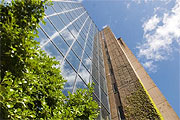Source: University of Glasgow
Notable People
Donald Dewar
-
Donald Dewar, 1959

-
Donald Dewar Statue

Source: By courtesy of the Mitchell Library, Glasgow City Council
-
Donald Dewar

Source: University of Glasgow
-
Donald Dewar, 1962

Source: University of Glasgow
-
Donald Dewar's matriculation record page 1, 1957

Source: University of Glasgow
-
Donald Dewar's matriculation record page 2, 1957

Source: University of Glasgow
First Minister of Scotland
Born 21 August 1937.
Died 11 October 2000.
First Minister of Scotland 1999-2000
Connection to the University of Glasgow: Alumnus, Honorary Graduate
GU Degrees: MA, 1961; LLB, 1964; LLD, 1998;
Discover more lawyers; politicians on the University of Glasgow Story website
Achievements
The following achievement is associated with Donald Dewar:
First Minister of Scotland 1999-2000
Donald Dewar, a major player in Scottish and UK politics, campaigned for Scottish devolution and masterminded the Scottish Bill through Westminster, becoming the first holder of the office of First Minister of Scotland.
Honours
The following honour is associated with this person:
Biography
Donald Dewar (1937-2000) was Scotland's first First Minister and is generally recognised as the architect of Devolution. After his death, the University created the Donald Dewar Scholarships and the Donald Dewar Lectureship. His name was added to the Memorial Gates in 2001 because of his long connection with the University, and in recognition of his outstanding contribution to the political and cultural life of Scotland.
Born in Glasgow, Dewar was educated at Mosspark Primary School and Glasgow Academy. His father, mother, two uncles and an aunt were graduates of the University and he followed them, matriculating in 1957. He studied History, graduating MA with Honours in 1961, and then studied Law, graduating LLB in 1964.
Dewar enjoyed student life to the full and became immersed in politics and debating. He and his friend John Smith lost in the Scottish round of the Observer Mace debating competition in 1960, but won The Scotsman debating trophy the following year. He went on to win the Observer Mace with Malcolm Mackenzie in 1963. He succeeded Smith as Chairman of the University Labour Club in 1961-62 and was President of the Union in 1962-63. He was also Honorary Secretary of the Students Representative Council, 1959-60; President of the Immoral Re-Armament Association, 1960-61, and campaigned successfully for the election of banned African National Congress leader Albert Luthuli as University Rector in 1963. He was editor of the Glasgow University Guardian, 1959-60 and publicity and sales manager for Glasgow University Magazine in 1960.
After graduating, Dewar maintained his involvement in politics while working as a solicitor. In 1962 he was selected as the Labour candidate for Aberdeen South and, although losing in the 1964 election, he captured the seat in 1966. He failed to hold it in 1970 and did not return to parliamentary politics until 1978, when he won the Garscadden constituency in Glasgow at a bye-election. He became shadow Secretary of State for Scotland in 1983, shadow Secretary of State for Social Security in 1992, and the Labour Party's Chief Whip in 1996. When Labour won the General Election in 1997, Dewar became Secretary of State for Scotland. He was awarded an honorary LLD in the following year.
Dewar was an outspoken advocate of political devolution for Scotland within the United Kingdom. He had been one of the leading lights in the Scottish Constitutional Convention, established in 1989 to create a forum for debate on constitutional change in Scotland. As Secretary of State, he led the campaign for a "yes" vote in the devolution referendum which was held that year. There were substantial majorities in favour of a Scottish Parliament and giving it the powers to vary tax rates, and Dewar was largely responsible for writing and then ensuring the passage of the Scotland Bill through the House of Commons. The Scotland Act was passed in 1998.
The new Scottish Parliament elected Donald Dewar to the post of First Minister after the election of 1999, and he presided over a coalition administration composed ministers from both the Labour and Liberal Democrat parties. In 2000, he suffered heart problems and he died after a fall in October. He was cremated at Clydebank on 18 October, by which time his obituarists had given him the title "Father of the Nation".

